Fabrizio Pregadio's Blog
April 8, 2019
The Book of the Hidden Agreement (Yinfu jing)
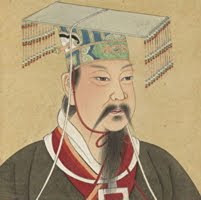 The Yellow Emperor (Huangdi),
The Yellow Emperor (Huangdi), traditionally ascribed with the authorship
of the Book of the Hidden AgreementDespite its brevity, the Yinfu jing (Book of the Hidden Agreement) is one of the most obscure and difficult Taoist texts. Within Neidan (Internal Alchemy), this work is especially well-known for its idea of "stealing the mechanism", which Neidan adepts understand as meaning inverting of the process that leads from the precelestial to the postcelestial domains.
Read three sections of the Yinfu jing on the Golden Elixir website.
A complete translation of the text, with the commentary by Yu Yan (1258-1314), is found in a chapter or Taoist Internal Alchemy: An Anthology of Neidan texts (Golden Elixir Press, paperback), and in a Kindle ebook, entitled The Book of the Hidden Agreement: A Taoist Text on the Harmony between Heaven and Humanity .

Published on April 08, 2019 15:22
March 22, 2019
Taoist Internal Alchemy: An Anthology of Neidan Texts
Golden Elixir Press is pleased to announce the publication of a new book:
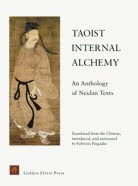 Taoist Internal Alchemy: An Anthology of Neidan Texts
Translated from the Chinese, introduced, and annotated by Fabrizio Pregadio
Taoist Internal Alchemy: An Anthology of Neidan Texts
Translated from the Chinese, introduced, and annotated by Fabrizio Pregadio
Paperback, US$ 24.95 ● € 24.00 (incl. VAT) ● GB£ 20 ● JP¥ 5000 (list prices)ISBN 978-0-9855475-5-4
This anthology presents complete or partial translations of sixteen major works belonging to the Taoist tradition of Neidan, or Internal Alchemy. While the selections are far from covering the whole field of Neidan — a virtually impossible task, given its width and variety — they are representative of its main lineages and branches. Texts have been selected in this perspective and are arranged chronologically, in order to provide an overview not only of Neidan, but also of the history of its discourses and practices. Four of the sixteen texts are integrally translated. Six texts and two commentaries are translated here (entirely or partially) for the first time into English. The book is concluded by several tables and by an index of the main terms.
See a preview of this book (PDF).
For more details, visit the page on this book in the Golden Elixir Press website. It contains:
• A detailed table of contents (click the "Contents" tab)• A list of new pages in the Golden Elixir website with short selections from this book (click the "Samples" tab)• A link to a free PDF with the Chinese texts translated in this book

 Taoist Internal Alchemy: An Anthology of Neidan Texts
Translated from the Chinese, introduced, and annotated by Fabrizio Pregadio
Taoist Internal Alchemy: An Anthology of Neidan Texts
Translated from the Chinese, introduced, and annotated by Fabrizio PregadioPaperback, US$ 24.95 ● € 24.00 (incl. VAT) ● GB£ 20 ● JP¥ 5000 (list prices)ISBN 978-0-9855475-5-4
This anthology presents complete or partial translations of sixteen major works belonging to the Taoist tradition of Neidan, or Internal Alchemy. While the selections are far from covering the whole field of Neidan — a virtually impossible task, given its width and variety — they are representative of its main lineages and branches. Texts have been selected in this perspective and are arranged chronologically, in order to provide an overview not only of Neidan, but also of the history of its discourses and practices. Four of the sixteen texts are integrally translated. Six texts and two commentaries are translated here (entirely or partially) for the first time into English. The book is concluded by several tables and by an index of the main terms.
See a preview of this book (PDF).
For more details, visit the page on this book in the Golden Elixir Press website. It contains:
• A detailed table of contents (click the "Contents" tab)• A list of new pages in the Golden Elixir website with short selections from this book (click the "Samples" tab)• A link to a free PDF with the Chinese texts translated in this book

Published on March 22, 2019 14:09
April 4, 2015
Golden Elixir Quote of the Week
After a break much longer than expected, the publication of the Golden Elixir Quote of the Week will resume within the next few days. No better time to subscribe! Read the previous 55 Quotes and subscribe from the page linked below. Subscription is free.
• Golden Elixir Quote of the Week
• Golden Elixir Quote of the Week
Published on April 04, 2015 17:17
February 8, 2015
The Way of the Golden Elixir (Free PDF)
Golden Elixir Press is pleased to announce the publication of:
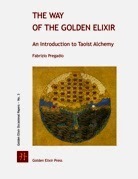
The Way of the Golden Elixir:
An Introduction to Taoist Alchemy
Fabrizio Pregadio
"Occasional Papers" Series, No. 3
Second edition, revised and expanded
72 pp.
Golden Elixir Press, 2014
This free PDF can be downloaded here:
• The Way of the Golden Elixir


The Way of the Golden Elixir:
An Introduction to Taoist Alchemy
Fabrizio Pregadio
"Occasional Papers" Series, No. 3
Second edition, revised and expanded
72 pp.
Golden Elixir Press, 2014
This free PDF can be downloaded here:
• The Way of the Golden Elixir
Published on February 08, 2015 14:27
April 6, 2014
A Translation of the Longmen "Lineage Poem"
Many Taoist lineages bestow "ordination names" or "lineage names" using the characters found in a specially-written poem. Each generation of disciples receives their names using in sequence one character of the poem. Thus the name of a first-generation master includes the first character; the name of a second-generation master includes the second character; and so forth. These poems are known in general as "lineage poems" (paishi).
The most famous "lineage poem" in Taoism is the one of the Longmen (Dragon Gate) lineage. Known as the "Longmen Lineage Poem" (Longmen paishi), the "Hundred-Character Lineage of Ancestor Qiu" (Qiuzu baizi pai), or in other similar ways, it is made of 20 verses of 5 characters. The 100 different characters of the poem should suffice to assign lineage names for about two and a half millennia, and perhaps even longer.
Below is a translation of the poem. Each word is translated with a different English word, and the translation retains the sequence of the words in each verse. While this results in a definitely not elegant (and possibily ungrammatical) translation, it gives a better idea of the nature and purpose of the poem.
Translation
The Dao and its Virtue pervade the mysterious quiescence,
true constancy guards the grand clarity.
The One Yang comes and returns to the root:
the united teaching is unendingly whole and bright.
The perfect principle is at the origins of sincerity and truthfulness:
venerable and lofty, it transmits the doctrine’s prosperity.
The world’s appearance is flourishing and thoroughly luxuriant,
the inaudible and imperceptible spreads and of-its-own is peaceful.
Dwell in cultivating the correct humanity and righteousness:
transcending and rising to the clouds, you will be able to ascend.
In the great subtlety the central yellow is honored:
the saintly body entirely performs its function.
In emptiness and vacuity, Qian and Kun are splendid:
Metal and Wood in their natures reciprocally meet.
In mountains and seas, Dragon and Tiger conjoin:
the lotus opens and manifests the treasure anew.
When the practice is complete, the red writ is proclaimed,
from the moon’s fullness an auspicious radiance is born.
For ten-thousand ages shall continue the immortals’ names,
and the three realms will all be akin.
Chinese Text
道德通玄靜,真常守太清。一陽來復本,合教永圓明。
至理宗誠信,崇高嗣法興。世景榮惟懋,希微衍自寧。
住修正仁義,超升雲會登。大妙中黃貴,聖體全用功。
虛空乾坤秀,金木性相逢。山海龍虎交,蓮開現寶新。
行滿丹書詔,月盈祥光生。萬古續仙號,三界都是亲。
Related Materials
For a version containing a longer introduction and short notes to the poem, please download this PDF from the Golden Elixir website:
• The Longmen "Lineage Poem": A Translation (PDF, 4 pages)
See also the free PDF: "The Longmen Lineage: Historical Notes" (Golden Elixir Press, Occasional Papers no. 4, free download)

The most famous "lineage poem" in Taoism is the one of the Longmen (Dragon Gate) lineage. Known as the "Longmen Lineage Poem" (Longmen paishi), the "Hundred-Character Lineage of Ancestor Qiu" (Qiuzu baizi pai), or in other similar ways, it is made of 20 verses of 5 characters. The 100 different characters of the poem should suffice to assign lineage names for about two and a half millennia, and perhaps even longer.
Below is a translation of the poem. Each word is translated with a different English word, and the translation retains the sequence of the words in each verse. While this results in a definitely not elegant (and possibily ungrammatical) translation, it gives a better idea of the nature and purpose of the poem.
Translation
The Dao and its Virtue pervade the mysterious quiescence,
true constancy guards the grand clarity.
The One Yang comes and returns to the root:
the united teaching is unendingly whole and bright.
The perfect principle is at the origins of sincerity and truthfulness:
venerable and lofty, it transmits the doctrine’s prosperity.
The world’s appearance is flourishing and thoroughly luxuriant,
the inaudible and imperceptible spreads and of-its-own is peaceful.
Dwell in cultivating the correct humanity and righteousness:
transcending and rising to the clouds, you will be able to ascend.
In the great subtlety the central yellow is honored:
the saintly body entirely performs its function.
In emptiness and vacuity, Qian and Kun are splendid:
Metal and Wood in their natures reciprocally meet.
In mountains and seas, Dragon and Tiger conjoin:
the lotus opens and manifests the treasure anew.
When the practice is complete, the red writ is proclaimed,
from the moon’s fullness an auspicious radiance is born.
For ten-thousand ages shall continue the immortals’ names,
and the three realms will all be akin.
Chinese Text
道德通玄靜,真常守太清。一陽來復本,合教永圓明。
至理宗誠信,崇高嗣法興。世景榮惟懋,希微衍自寧。
住修正仁義,超升雲會登。大妙中黃貴,聖體全用功。
虛空乾坤秀,金木性相逢。山海龍虎交,蓮開現寶新。
行滿丹書詔,月盈祥光生。萬古續仙號,三界都是亲。
Related Materials
For a version containing a longer introduction and short notes to the poem, please download this PDF from the Golden Elixir website:
• The Longmen "Lineage Poem": A Translation (PDF, 4 pages)
See also the free PDF: "The Longmen Lineage: Historical Notes" (Golden Elixir Press, Occasional Papers no. 4, free download)

Published on April 06, 2014 13:28
March 14, 2014
The Longmen Lineage: Historical Notes (Free PDF)
Golden Elixir Press is pleased to announce the publication of a new occasional paper:
The Longmen Lineage: Historical Notes
(PDF, 25 pp., free download)
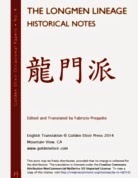 This essay contains a short history of the Longmen (Dragon Gate) lineage, to which many masters of Neidan (Taoist Internal Alchemy) claim affiliation. It presents the main stages of development of Longmen, and briefly describes its main branches and its main masters.
This essay contains a short history of the Longmen (Dragon Gate) lineage, to which many masters of Neidan (Taoist Internal Alchemy) claim affiliation. It presents the main stages of development of Longmen, and briefly describes its main branches and its main masters.
The essay is translated from the chapter "Longmen pai" (The Longmen Lineage) in Zhongguo daojiao (Chinese Taoism), ed. by Qing Xitai (4 vols; Chengdu: Sichuan renmin chubanshe, 1994), vol. 1.
• Click the picture or here for the download page in the Golden Elixir website.
The Longmen Lineage: Historical Notes
(PDF, 25 pp., free download)
 This essay contains a short history of the Longmen (Dragon Gate) lineage, to which many masters of Neidan (Taoist Internal Alchemy) claim affiliation. It presents the main stages of development of Longmen, and briefly describes its main branches and its main masters.
This essay contains a short history of the Longmen (Dragon Gate) lineage, to which many masters of Neidan (Taoist Internal Alchemy) claim affiliation. It presents the main stages of development of Longmen, and briefly describes its main branches and its main masters.The essay is translated from the chapter "Longmen pai" (The Longmen Lineage) in Zhongguo daojiao (Chinese Taoism), ed. by Qing Xitai (4 vols; Chengdu: Sichuan renmin chubanshe, 1994), vol. 1.
• Click the picture or here for the download page in the Golden Elixir website.

Published on March 14, 2014 16:54
March 3, 2014
"Awakening to Reality": 20% Discount in March 2014
Awakening to Reality
The "Regulated Verses" of the Wuzhen pian,
a Taoist Classic of Internal Alchemy
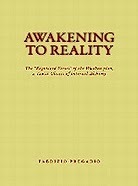 Awakening to Reality (Wuzhen pian) is one of the most important and best-known Taoist alchemical texts. Written in the 11th century, it describes in a poetical form, and in a typically cryptic and allusive language, several facets of Neidan (Internal alchemy). This book presents the first part of the text, consisting of sixteen poems that contain a concise but comprehensive exposition of Neidan. In addition to the translator's notes that clarify the meaning of the more obscure points, the book also contains selections from Liu Yiming's commentary (late 18th century), which is distinguished by the use of a lucid and plain language.
Awakening to Reality (Wuzhen pian) is one of the most important and best-known Taoist alchemical texts. Written in the 11th century, it describes in a poetical form, and in a typically cryptic and allusive language, several facets of Neidan (Internal alchemy). This book presents the first part of the text, consisting of sixteen poems that contain a concise but comprehensive exposition of Neidan. In addition to the translator's notes that clarify the meaning of the more obscure points, the book also contains selections from Liu Yiming's commentary (late 18th century), which is distinguished by the use of a lucid and plain language.The paperback and PDF editions of Awakening to Reality are offered with a 20% discount until March 31, 2014.
• Paperback: US$ 15.95 12.75• PDF: US$ 9.95 7.95
For the discount codes see this page of the Golden Elixir website:
• Awakening to Reality (Wuzhen pian)
For the Kindle edition of Awakening to Reality, visit the Amazon.com USA Store, or the store nearest to your country: France • Germany • Italy • Japan • Spain • UK.

Published on March 03, 2014 13:56
February 6, 2014
Liu Yiming on the Internal Companions
▶ Quoted from Cultivating the Tao: Taoism and Internal Alchemy, by Liu Yiming, page 155 — Read more about this book
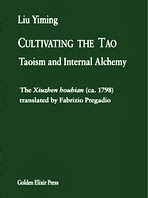 . . . Therefore being connected with companions who have the same mind is the most important thing in the cultivation of the Tao. However, companions who share the same mind are very difficult to discern. They have no form and no image, no sound and no color, no front and no back. Facing evil, they transform themselves into yakshas; facing goodness, they transform themselves into bodhisattvas.(1) Their transformations have no limit: they conceal or manifest themselves in unfathomable ways. Everyone has them in front of their eyes, but misses them. If you are unwilling to discern the true, day after day they increasingly separate from you.
. . . Therefore being connected with companions who have the same mind is the most important thing in the cultivation of the Tao. However, companions who share the same mind are very difficult to discern. They have no form and no image, no sound and no color, no front and no back. Facing evil, they transform themselves into yakshas; facing goodness, they transform themselves into bodhisattvas.(1) Their transformations have no limit: they conceal or manifest themselves in unfathomable ways. Everyone has them in front of their eyes, but misses them. If you are unwilling to discern the true, day after day they increasingly separate from you.When all of a sudden an intimate friend appears, you become of one mind with him: walking, standing, sitting, or lying, neither of you separates from the other for a single instant. . . . Those who intend to cultivate Reality might be without external companions, but should never be without internal companions.
(1) In Buddhism, a yaksha is a minor deity who protects from evil, and a bodhisattva operates for the liberation of all beings. Liu Yiming seems to say here that the “internal companions” protect one in unfavorable circumstances, as do the yakshas, and support one when the circumstances are favorable, as do the bodhisattvas.
Subscribe to the free Golden Elixir Quote of the Week — Short quotations on Internal Alchemy (Neidan) from books published by Golden Elixir Press - View a list of Quotes published until present

Published on February 06, 2014 10:27
January 20, 2014
Wu Shouyang on the Alchemical Embryo
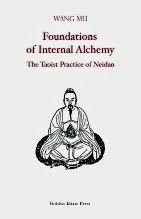 The stage of "refining Breath to transmute it into Spirit" constitutes an advanced stage of the alchemical work, in which one's practice progresses from "doing" to "non-doing." The Great Medicine is called Embryo of Sainthood (shengtai) or Infant (ying'er). Both terms are actually metaphors for Spirit and Breath coagulating and coalescing with one another. Wu Shouyang explains the meaning of these terms saying:
The stage of "refining Breath to transmute it into Spirit" constitutes an advanced stage of the alchemical work, in which one's practice progresses from "doing" to "non-doing." The Great Medicine is called Embryo of Sainthood (shengtai) or Infant (ying'er). Both terms are actually metaphors for Spirit and Breath coagulating and coalescing with one another. Wu Shouyang explains the meaning of these terms saying:"Metaphorically it is called 'embryo,' as if there is truly an embryo. In fact, however, there is no embryo. Why is it so? Because according to the principle of giving birth, one generates the embryo of a child in the womb; and according to the principle of cultivating immortality, one generates an embryo of Spirit in the Heart. The worldly people hear the word 'embryo' and say that within the womb there is truly an embryo, which then leaves and becomes 'a body outside the body' (shen wai shen). This is truly risible. Essentially, the human nature is perfectly empty and perfectly numinous; it is devoid of a form and a body." (1)
(1) Wu Shouyang (1574-1644), Xian Fo hezong yulu (Recorded Sayings on the Common Origin of the Immortals and the Buddhas), with minor omissions and changes
▶ Quoted from Foundations of Internal Alchemy: The Taoist Practice of Neidan, by Wang Mu, page 107— Read more on and from this book
Subscribe to the free Golden Elixir Quote of the Week — Short quotes on Internal Alchemy (Neidan) from books published by Golden Elixir Press - View a sample and the subscription form

Published on January 20, 2014 17:23
January 14, 2014
Qian and Kun, Kan and Li
▶ Quoted from The Seal of the Unity of the Three: A Study and Translation of the Cantong qi, the Source of the Taoist Way of the Golden Elixir, by Fabrizio Pregadio, pages 78-79— Read more on and from this book
Qian ☰ the firm and Kun ☷ the yielding
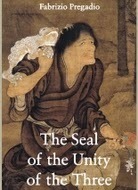 join and embrace one another;
join and embrace one another;Yang endows, Yin receives,
the masculine and the feminine attend
one to the other.
Attending, they create and transform,
unfolding their Essence and Breath.
Kan ☵ and Li ☲ are at the fore:
their radiance and glow come down
and spread out.
Mysterious and obscure, this can hardly
be fathomed
and cannot be pictured or charted.
The sages gauged its depth;
one with it, they set forth its foundation.
These four, in indistinction,
are right within Empty Non-Being.
Sixty hexagrams revolve around them,
outspread like a chariot.
Harnessing a dragon and a mare,
the bright noble man holds the reins of time.
In harmony there are following and compliance:
the path is level and begets no evil.
Evil ways obstruct and hamper:
they endanger the kingdom.
 20% discount on the paperback edition
20% discount on the paperback editionBuy from CreateSpace — Use Discount Code XK73HZN5 at checkout
 20% discount on the abridged PDF edition
20% discount on the abridged PDF editionBuy from the Golden Elixir website — Use Discount Code january2014 at checkout
Subscribe to the free Golden Elixir Quote of the Week — Short quotes on Internal Alchemy (Neidan) from books published by Golden Elixir Press - View a sample and the subscription form

Published on January 14, 2014 10:04



